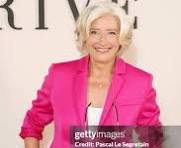TV Review: Slow Horses
By Tandy Culpepper and Lisa Johnson-Mandell
The spy thriller Slow Horses, streaming on Apple TV+, is as sharp as it is grimy—a cold, gray tale of espionage and incompetence that somehow manages to make failure feel like the most British kind of charm. Based on the Slough House novels by Mick Herron, the show centers on a ragtag group of disgraced MI5 agents who’ve been banished to a bureaucratic purgatory. There, under the reluctant and foul-mouthed leadership of Jackson Lamb—played with growling brilliance by Gary Oldman—they are meant to push paper and stay out of the way. Of course, they don’t.
Tandy Culpepper says, “I love this series. I absolutely do. There are so many quirky characters in the show, which for me makes it a delight. And here’s the thing—it has been so successful, people, and I mean the audiences, are anticipating the release of each season. Make that of each new season.”
Lisa Johnson-Mandell, on the other hand, is not quite as enamored. “I don’t quite feel so much affection for it,” she says. “As a matter of fact, Jackson Lamb is so dirty and so gross and so physically dirty, I have to bring air freshener in the room. I just want to go and take a shower every time I see him. I realize I am alone in thinking that because he’s always nominated for an Emmy ever since the show’s first season. People love him.”
But that’s also part of what makes Slow Horses so compelling. It’s a show about the middlemen, the screwups, the forgotten ones still doing the job because someone has to. It’s less Bond, more Le Carré after three pints and a lost pension. For those who like their spycraft slow-burning and their heroes a little moldy, Slow Horses is a standout. Just know it’s not a fast ride—and not everyone wants to be taken for a long crawl through bureaucratic back alleys.
Verdict? One critic is all in. The other’s still waiting to be won over. Either way, this stable of “slow horses” has certainly left the gate.
TV Review: The Last of Us, Season Two
By Tandy Culpepper and Lisa Johnson-Mandell
The second season of The Last of Us, HBO’s apocalyptic prestige drama adapted from the beloved video game, arrives with heavy expectations—and a slightly heavier heart. Following a critically acclaimed debut that balanced harrowing survivalist tension with emotional depth, the new installment is both a continuation and a tonal shift. And while Lisa Johnson-Mandell found herself riveted by the expanding moral complexity and intimacy of the series, Tandy Culpepper wasn’t quite as taken this time around.
Lisa describes The Last of Us Season Two as “a haunting meditation on grief, vengeance, and the fragile threads of humanity that persist in a broken world.” She praises Bella Ramsey’s portrayal of Ellie as “raw and fearless,” and calls the show’s bold structural risks—nonlinear storytelling, long character-centric episodes, and stretches of eerie quiet—“deeply rewarding.” “It dares to slow down and look loss in the eye,” she says. “It’s not just about infected and survival. It’s about what we become after the worst has happened.”
Tandy, meanwhile, finds the pacing far less satisfying. “I respect the artistry,” he says. “But if Season One was a gripping, genre-defining road trip, Season Two often feels like getting stuck in traffic on the same highway.” He notes that while some episodes are undeniably beautiful—particularly those involving new character arcs and side stories—too many moments left him waiting for the emotional engine to restart. “There’s a weight to this season, and not all of it is narrative,” he quips.
The show, once again helmed by Craig Mazin and Neil Druckmann, continues to stand apart from standard zombie fare. There’s a quiet, elegiac quality to the storytelling that resonates deeply with Lisa. She highlights the addition of new characters like Abby (played with simmering tension by Kaitlyn Dever) as “brilliant casting that pushes the story into morally murky territory.” For her, the emotional risks pay off in spades.
Tandy, however, misses the more direct storytelling of the first season. “The flashbacks are thoughtful. The character studies are careful. But there’s a sense of urgency that’s missing,” he explains. “It’s beautifully made, but I didn’t feel as compelled to hit ‘next episode’ as I did a year ago.”
Where they both agree is on the visual and technical mastery of the series. The crumbling cities, overgrown highways, and fungal terrors remain exquisitely rendered. The sound design continues to amplify dread in subtle, unsettling ways. And the series is unafraid to treat its audience with respect, even if it sometimes demands patience.
Ultimately, The Last of Us Season Two remains a bold and ambitious work, one that chooses introspection over adrenaline, grief over gore. Lisa calls it “a triumph of mature storytelling in a genre that rarely gets this kind of treatment.” Tandy, while more restrained in his praise, acknowledges its craftsmanship even as he yearns for the spark that lit the fire in Season One.
In the end, whether you find this season absorbing or meandering may depend on how much loss you’re willing to sit with—and how long you’re willing to wait for catharsis in a world that promises very little of it.




